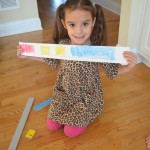 This past week I was in TX for their annual music educators conference (If you haven’t been, you should seriously consider going ~ it is AMAZING!!) and I got into a long discussion about music literacy with a colleague. The question became ~ should music literacy be taught in K-2 when we have so little time with them? A valid question and one that has no easy answer. (Of course the real answer is that we need more time with our students and the world would be a much better place if we did see them every day for an hour, but it does not seem like that will be happening any time soon, so onward and upward!)
This past week I was in TX for their annual music educators conference (If you haven’t been, you should seriously consider going ~ it is AMAZING!!) and I got into a long discussion about music literacy with a colleague. The question became ~ should music literacy be taught in K-2 when we have so little time with them? A valid question and one that has no easy answer. (Of course the real answer is that we need more time with our students and the world would be a much better place if we did see them every day for an hour, but it does not seem like that will be happening any time soon, so onward and upward!)
What is music literacy? Why do we have it at all? Well, without it, we would have lost the most beautiful works by the great composers…and the execution of a symphony would be rather challenging!! In the end, though, it is a recording of one’s thoughts and ideas expressed through something more powerful than words. Shouldn’t young children have a chance to do this? Instead of always being within the teacher’s ideas, shouldn’t we allow them to have a chance to share their own ideas, as well? I would imagine most, if not all, are in agreement thus far. So why have them write music down at all? Simple: there is power in independence. Children are empowered when they are encouraged to record what they think about what they are learning.
We do allow for improvisation, but within OUR parameters! What if we allow them to create on their own, for their own purpose, what then? I think Carl Orff said it best when he said, “I encouraged the activation of the students by the playing of their own music, that is, through improvisation and composing it themselves. I therefore did not want to train them on highly developed art instruments, but rather on instruments that were preferably rhythmic, comparatively easy to learn, primitive and unsophisticated.” To me this says it all. (You can read more on this in a birthday post I had written awhile back…) If we give them the tools, they can do great things on their own. I’ve said it before and I will say it again, we underestimate children ALL of the time. Who are we to determine what their capacity is? It is our job to be their facilitators, not their gurus!
I encourage you to weigh in on this debate. I want to hear your thoughts as there are many philosophies out there.

0 Comments